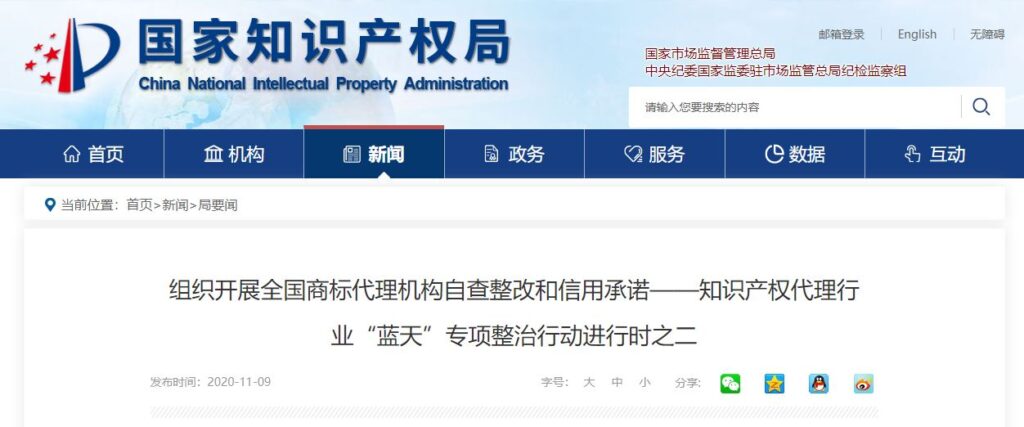In a notice issued November 9, 2020, the China National Intellectual Property Administration announced that it organized a comprehensive review of the 47,000 trademark agencies registered with CNIPA under the Blue Sky IP industry rectification campaign. Through self-examination, the top violation of trademark law and regulation by trademark agencies was the malicious squatting and hoarding of trademarks with 858 cases (44.94% of all violations); unlicensed practice of patent law 561 (29.4% of the total) was second; third, worryingly, was forging or altering legal documents, seals and signatures at 488 cases (25.56% of the total); and fourth, 2 cases of soliciting trademark agency business by improper means.
This second phase of the Blue Sky program had 5 preliminary results and follows up on the earlier announcement re patent agencies.
I. Status of Trademark Agencies. 23,000 of the 47,000 registered trademark agencies nationwide had performed trademark agency services and completed the self-examination.
II. Urge Trademark Agencies to Learn and Self-Regulate. In the process of completing self-inspection, trademark agencies studies the relevant trademark law.
III. Commitment to Abide by the Law. 23,000 trademark agencies signed a letter of commitment to abide the by law, i.e., less than half of all registered trademark agencies committed to following the law. Specifically, forgery and alteration of legal documents, seals, and signatures are strictly prohibited; the use of improper means to solicit trademark agency business is strictly prohibited; it is strictly forbidden to disturb the order of the trademark agency market by improper means; malicious squatting and hoarding are strictly prohibited; and prohibit unqualified patent agency services.
IV. To Understand the Type of Trademark Agency Violations. As mentioned above, this include trademark squatting, unlicensed practice of patent law, forgery, and soliciting trademark agency business by improper means.
V. Establish Key Targets for Trademark Agency Supervision. Based on the 22,000 self-examination reports received and other data, a key monitoring catalog was generated and a number supervision goals generated.
For agencies that conduct self-inspection seriously, penalties will mainly be warnings, education, and urging rectification. For those that do not comply, CNIPA will organize local offices to conduct inspections and those who violate law and regulations will be severely punished in accordance with law (e.g., Alibaba’s fine for attempting to maliciously register coronavirus related trademarks).
